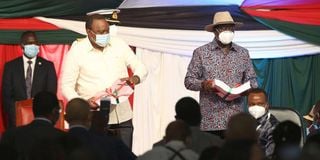Uhuru, Raila dangle BBI carrots as they kick off signatures drive

President Uhuru Kenyatta and former Prime Minister Raila Odinga distribute BBI signing documents to regional representatives at Kenyatta International Convention Center on November 25, 2020 when they launched the collection of signatures.
What you need to know:
- The proposal to entrench the Nairobi Metropolitan Services (NMS) removed as Nairobi will now remain with all its devolved functions.
- Four Rift Valley counties — West Pokot, Nandi, Bomet and Uasin Gishu — to get an additional four constituencies.
The creation of an extra 70 constituencies, and dropping twin-proposals for an executive-controlled police council and nomination of electoral commissioners by parties, are among radical changes in the Bill to amend the Constitution.
The revised Bill released on Wednesday, when President Kenyatta and ODM leader Raila Odinga launched a campaign to collect one million signatures, also hands more powers to the Senate and reintroduces special top-up seats in the National Assembly as well as further expansion of the executive with the introduction of deputy ministers.
Members of the county assemblies (MCAs) who got a Ward Development Fund in the earlier draft, have secured yet another concession — an opportunity to be appointed as County Executive Committee Members (CECs).
The new changes appear to placate key constituencies that are instrumental to the passage of the Bill, and which had raised some grievances, including religious leaders, who secured inclusion of the provision “supremacy of the almighty God in shaping the destiny of the country.”
The proposal to entrench the Nairobi Metropolitan Services (NMS), which has taken over four key functions from Nairobi County, in the Constitution, has also been removed as Nairobi will now remain with all its devolved functions.
Initially, the 70 National Assembly seats were to be filled through party lists, but the Bill now proposes creation of 70 new constituencies, which will increase the number of the electoral units from 290 to 360.
The distribution of the seats is also revised to gift four Rift Valley counties — West Pokot, Nandi, Bomet and Uasin Gishu — an additional four constituencies.
Win over voters
Kwale is the other winner of an extra seat, which, however, sees Nairobi’s share cut from 16 to 12.
The Bill adds Kwale three constituencies, Bomet (2), and Uasin Gishu (3), while West Pokot and Nandi, which were not in the initial list of beneficiaries, secure one each.
This is seen as an attempt to win over voters in the Rift Valley, which is perceived to be a stronghold of Deputy President William Ruto, who has opposed some of the Building Bridges Initiative’s proposals.
The new amendments offer leeway for a governor to appoint an MCA into the executive committee.
Governors are also supposed to be accountable to their respective assemblies. This is seen as a move to empower MCAs, who are crucial in the passage of the Bill as at least 24 assemblies must approve it before it moves to Parliament.
Senate will also approve the appointment of the Controller of Budget, Judiciary Ombudsman and National Youth Commission commissioners.
The posts of Majority and Minority leaders are also reinstated.
In addition, Senators will have oversight on revenue raised by counties and funds from other sources such as borrowing, unlike the present case, where their role is limited to the allocation from the National Government.
On Wednesday, President Kenyatta stated that the views expressed after the launch of the BBI report at Bomas of Kenya on October 26 had been considered in the final Bill released yesterday at the Kenyatta International Convention Centre (KICC) in Nairobi.
Ideas and ideals
“I am, therefore, confident that this process has been widely consultative and has captured the best of our ideas and ideals,” the President said.
He pointed out that “this is not the end of the process as Kenyans will continue to express themselves and eventually make a choice on the fate of this referendum Bill.”
Another change stipulates that a Prime Minister and the Leader of Official Opposition should not come from the same party.
To ensure compliance with the two-thirds gender rule, the Bill proposes a legislation to compel parties to ensure not more than two-thirds of candidates for election are of the same gender.
Another proposal mandates the Independent Electoral and Boundaries Commission (IEBC) to ensure a list of candidates nominated by a political party for an election comply with the principle that not more than two-thirds of the nominated candidates shall be of the same gender.
Dr Ruto had expressed his reservations on having political parties participate in the appointment of the IEBC commissioners, expansion of the executive, establishment of the National Police Council with the office holder appointed by the President as well as creation of the Office of the Judiciary Ombudsman, who will be a presidential appointee.
But despite most of his misgivings being addressed, and unlike Amani National Congress (ANC) party leader Musalia Mudavadi, the DP was on Wednesday still insisting on the need for consensus.





